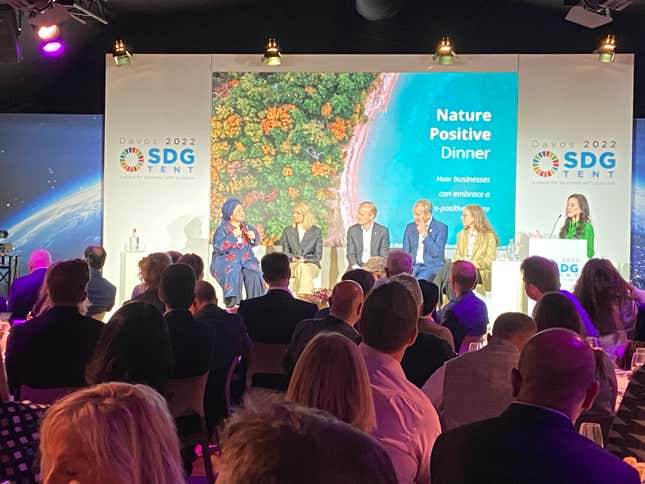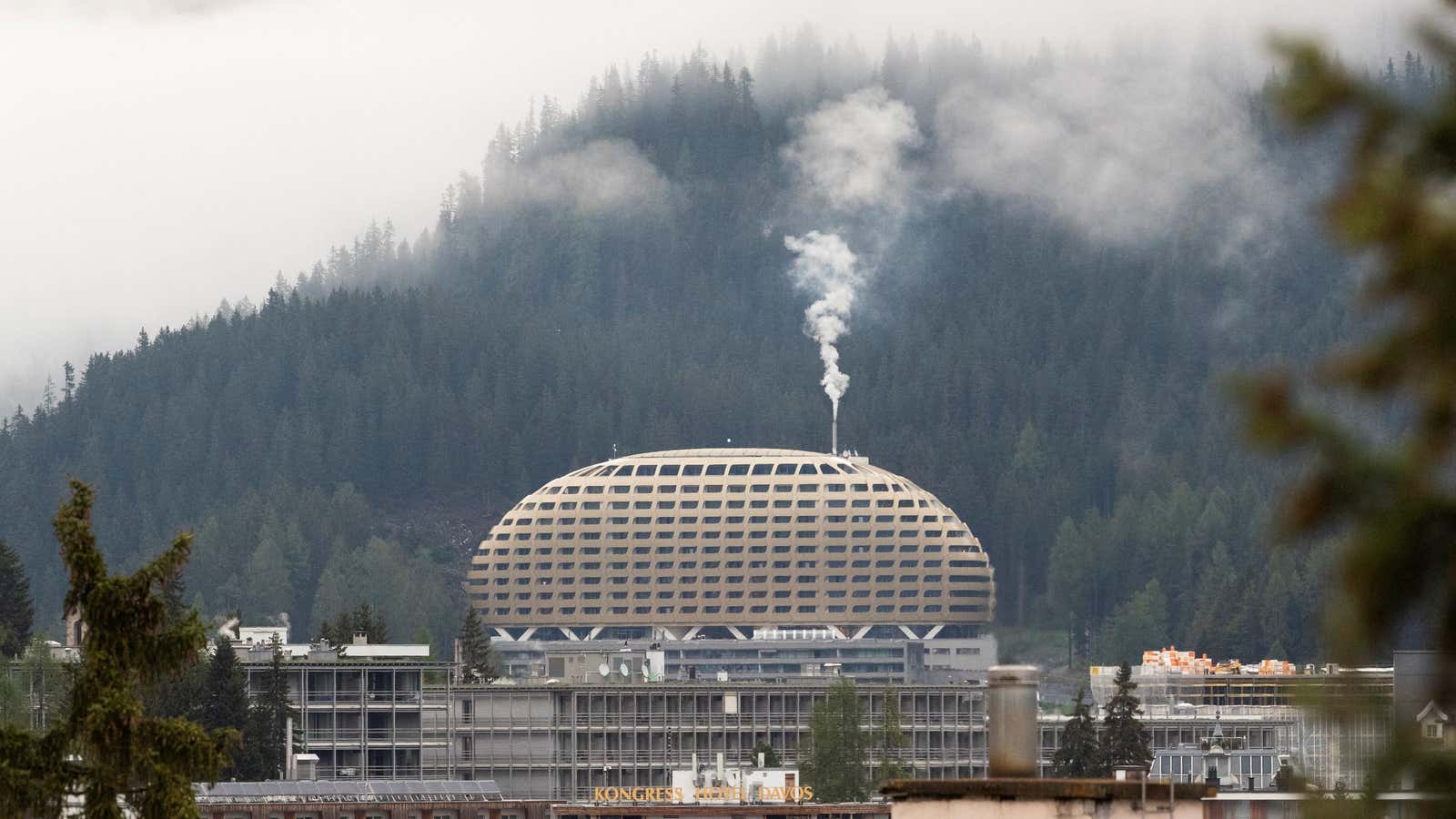Greetings, delegates and WEF watchers!
We’ve reached the halfway mark: two days of discussions, prognostications, and billionaires’ dinner parties down; two to go. Today’s weather forecast looks a lot like yesterday’s, which is to say still very un-Davos like. Keep that umbrella handy.
How detached are markets from economic reality? Less so now than a few weeks ago, certainly. But the question remained a compelling title for a panel Tuesday at the Congress Centre, where Goldman Sachs’ Kathryn Koch said now is no time to sell. “[T]his is the point where people inflict a lot of damage” on their portfolios by capitulating, she argued.
Instead, there are now some “overly discounted” stocks in the tech market that are worth a look, she said, primarily in semiconductors (still the backbone of innovation), cybersecurity (where the geopolitical tailwind is strong), and software. If you want to test her thesis, find any CEO on the Promenade this week and ask if they intend to cut their enterprise spending. “Very few of them will say yes,” Koch predicted.
👀 What to watch for today
The future of Europe. A few years ago, the prospective splintering of the European Union loomed over every post-Brexit conversation. But after Russia’s invasion of Ukraine, unity on the continent has heralded fresh hope for the European project. Christine Lagarde, president of the European Central Bank, joins the leaders of Ireland, the Slovak Republic, and the Netherlands in a livestreamed 10am panel to lay out the future of a more assertive Europe.
The cost of living. The dilemma of modern livelihoods is this: Prices are now rising furiously, just after covid depressed wages in two-thirds of the world’s countries. How can policymakers remedy this? At 11:45am, economist Adam Tooze steers his panelists through the thickets of inflation control. Then a 4pm session addresses the really thorny question: How do we ensure that companies and governments pay fair living wages for their workers?
#TeamEarth. What do John Kerry, will.i.am, Kristalina Georgieva, and Yo-Yo Ma have in common? They’re all Marc Benioff’s guests today at an invitation-only lunch in the Salesforce dome.
Everything, everywhere, all at once. At 5:30pm, Davos witnesses a perfect storm of sessions about some of the biggest geopolitical questions facing the world. One group of speakers discusses how to devise better ESG standards, while Al Gore and his fellow panelists lambast greenwashing. Fareed Zakaria asks policymakers and bankers about “economic iron curtains” and new blocs of economic cooperation arising in the wake of the Ukraine war. A new research commission seeks to understand how to value and manage water. Another panel debates the future of the global gig economy.
🔌 Moynihan feels for Musk
Last week, Elon Musk took Standard & Poor’s to task, incensed that Tesla got dropped from the firm’s index of companies with high environmental, social, and governance (ESG) scores, while Exxon and other oil companies were included. Musk’s beef boils down to a complaint that ESG scores are meaningless because the methods used to tally them are shadowy, inconsistent, and don’t reflect a company’s real impact on the climate.
Brian Moynihan, Bank of America’s CEO, is sympathetic. “I have the same frustration,” he said on a panel about improving ESG. Government regulators need to set clearer, more specific rules for corporate ESG disclosures, and make sure they are consistent internationally, Moynihan said. Without that clarity, warned Alan Jope, Unilever’s CEO, who was also on the panel, “we’re at a point of great danger” that ESG becomes a costly rubber-stamping exercise for companies, and is seen as hot air by customers.
🔮 Davos’ prophet of doom
The George Soros dinner is a WEF institution, although it occurs on the sidelines of the summit. This year, at the Seehof Hotel, invitees drank champagne and mingled for a strict half-hour before being summoned to eat their salads, so that Soros could speak at 7pm sharp.
Like a dapper-suited Cassandra, Soros warned his guests of the end of civilization, and not only because of climate change. Xi Jinping, gunning for a third term as China’s president, was pursuing a nihilistic zero-covid policy, Soros said, and Vladimir Putin’s invasion of Ukraine threatens to start a new world war. (At some point, chicken and polenta were served.) Soros praised Europe’s leaders for uniting during this crisis, but advocated forcefully that “the best and perhaps only way to preserve our civilization is to defeat Putin as soon as possible.” The more stirring show of support for Ukraine, though, came at a later Davos dinner, when an assembly of Ukrainians rose to sing their national anthem.
👁️ Positively clear-eyed
The Nature Positive dinner organized by the World Wildlife Fund ran late into the evening, but those who left early missed out. Former US vice president Al Gore closed the event with a fiery speech that was part warning to the world and part encouragement to the environmentally conscious crowd in the SDG Tent.
Echoing sentiments shared earlier in the program by Swiss philanthropist André Hoffmann (“It’s not getting better, is it?”) and Bezos Earth Fund director Andrew Steer, who acknowledged the dissonance between the passion in the room and the results on the ground, Gore addressed the specter of our collective failure to preserve nature and protect humanity. “We are entering a period of consequences,” Gore said. But “this group, small as it is but dedicated and passionate as you are…can make a difference. Do not doubt this is true.”

😬 The bottom line
“Profit can’t be the goal here. Survival has to be the goal.”—Kahea Pacheco, co-executive director of Women’s Earth Alliance, at a session on accelerating corporate investment in nature.
🌍 Africa’s potential
“Singapore is a rock in the middle of the ocean? What do they have [that African countries don’t]? Human capital.” — Patrick Achi, prime minister of Côte d’Ivoire
Côte d’Ivoire is one of the world’s largest exporters of cocoa. Yet even though cocoa is a $138 billion market, Côte d’Ivoire only gets $8 billion a year from it. Human capacity constraints mean the country is mostly limited to exporting raw material. In a session on “Preparing for Africa’s Growing Global Role,” Achi estimated that if a significant portion of cocoa could be processed locally, the country’s GDP could grow by up to 70%.
↔️ China’s choice
At a panel on China’s role in the energy transition, speakers circled the tension between renewables and the challenges of energy security. On one hand, China installed more wind power than the rest of the world combined, overachieving on Beijing’s climate goals. But a power crisis that caused rolling blackouts across the country looms over China’s climate ambitions, and energy security, as the panel noted, is back on the table.
While this could mean more urgent investment in renewable energy, it more often means more investment in conventional energy, which for China means more coal.
🎹 A letdown, no doubt
The headliner at Cloudflare’s annual Davos bash, Gwen Stefani, dropped out ahead of the Wednesday late-night party. “A personal emergency,” Cloudflare’s email explained. In her place, The Chainsmokers have been flown in to perform at Barry’s Piano Bar, midway through their US tour for their latest album, “So Far So Good.” They may take requests and dedications, in which case, we have a few suggestions:
🎵 “You Owe Me” — as the crypto investors told the crypto bros
🎵 ”I Hope You Change Your Mind” — a call-out to Elon Musk by Twitter shareholders
🎵 “PS. I Hope You’re Happy” — dedicated to inflation hawks by rate-hiking central bankers
🎵 “Something Just Like This” — for the disease experts warning about the next pandemic
🎵 “Bloodstream” — for Stephane Bancel, the CEO of Moderna
🎵 “It Won’t Kill Ya” — requested by the fossil fuel executives
🎵 “Kills You Slowly” — requested immediately afterward by Al Gore
🎵 “Everybody Hates Me” — requested in absentia by Vladimir Putin
🌐 News from elsewhere
Russia and China flexed as Joe Biden visited Asia. The two countries held a joint military exercise, deploying bombers in northeast Asia as the US president met with regional leaders in Tokyo.
The WHO said monkeypox is “containable.” The disease has spread to a dozen countries, and the US is trying to release its monkeypox vaccine soon for high-risk individuals.
Snap snapped. The social media company’s stock fell 40% after CEO Evan Spiegel warned of hardship ahead—but don’t call its comeback over.
Leaks shed light on China’s camps. The photos and videos, published by a media consortium ahead of a visit by the UN’s high commissioner, show violent enforcement tactics in Xinjiang’s detention camps for Uyghurs and other Muslim minority groups.
🤓 Thanks for reading Quartz!
Want more carefully curated news items like this in your inbox? Every weekday, the Quartz Daily Brief delivers the most important and interesting news from the global economy, straight to your email. Sign up here.
Our best wishes for a productive day. Today’s Need to Know: Davos was brought to you by Samanth Subramanian, Heather Landy, and Katherine Bell, with contributions by Tim McDonnell, Aurora Almendral, and Ciku Kimeria.
